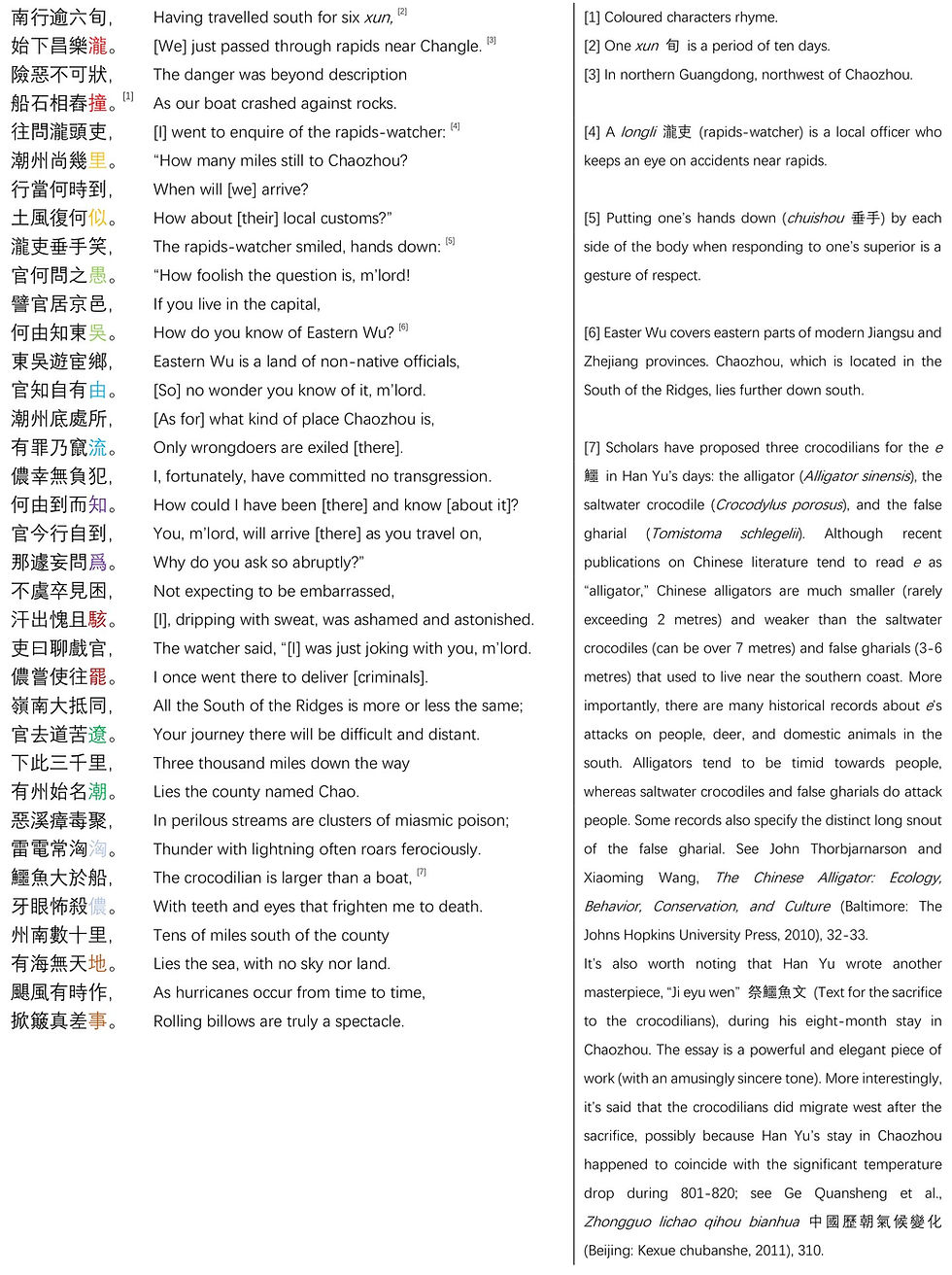韓愈《瀧吏(節選)》 “Rapids-Watcher” (excerpt) by Han Yu
- Rachelle

- Jan 4, 2021
- 3 min read
Updated: Jan 17, 2021
In 819, the eminent Tang essayist and poet Han Yu 韓愈 (768-824) submitted a memorial admonishing the emperor for his veneration of a bone-relic of the Buddha. Although he escaped the death penalty, he was exiled to Chaozhou 潮州 on the southern coast and became another famous example of literati abandoned to the bleak land in the South of the Ridges.
As I travelled down south to the Chaoshan 潮汕 (a contraction of the names of its two main cities, Chaozhou and Shantou 汕頭) region, it seemed fit to read Han Yu. The following excerpt comes from a long poem he wrote on his way to Chaozhou. Literary critics have praised this poem for its dialogue form and the use of colloquial words from regional language (e.g. nong 儂 as the first person pronoun), both reminiscent of pre-Tang poetry such as yuefu 樂府 (Music Bureau).

* From Han Changli quanji 韓昌黎全集 (Shanghai: Shijie shuju, 1935), 103-104
The rapids-watcher continues to prompt the poet to reflect on what he had done wrong that brought him to such a land of exiles. The rest of the poem is almost an expression of repentance, or perhaps Han Yu’s attempt to persuade himself to understand the emperor’s decision and not to harbour any resentment. But all that is less interesting to a reader who only wants to learn a bit about the historical image of her travel destination.
A depiction of an e by Nie Huang 聶璜 (fl. 17th century) in Haicuotu 海錯圖, based on a sketch by Yu Bojin 俞伯謹, a Fujian person who reported that he saw three e, each measuring 6 metres, in Vietnam.
Although Han Yu shaped Chaozhou’s image as a crocodilian habitat in literary history, the poet’s influence seems to have been eclipsed by other features of the region nowadays. First of all, Chaoshan has a nationwide reputation as a region of machismo. My Guangdong friends all recommend against dating a guy from Chaoshan, and it would appear that most Chaoshan boys tend to end up marrying Chaoshan girls. On the other hand, Chaoshan is celebrated for its fascinating culinary culture. As I walked through the streets and along the river in the city of Shantou, it was clear that the place is much less developed than other cities in Guangdong such as Guangzhou and Shenzhen. However, this also means one can get amazing food at amazing prices. There was absolutely no disappointment with all food I tried. Great changfen 腸粉 (rice noodle rolls), great niunan guotiaotang 牛腩粿條湯 (rice noodle soup with stewed brisket), and the region’s signature beef balls were just incredible.
Probably because I was totally distracted by food, I forgot to look for crocodilians. Also, my short stay witnessed no hurricane, no billows, no thunder. Despite the controversy about Chaoshan, I found myself in a much more attractive region than it might have been in Han Yu’s days. In fact, before I left, I had already started to plan for another trip there with my friends. This region on the southern coast is no longer a land of wrongdoers, but a paradise for foodies.
Copyright Declaration*:
The texts and images used on the website of Rachelle's Lab are either from the public domain (e.g. Wikipedia), databases with open data licences (e.g. Shuhua diancang ziliao jiansuo xitong 書畫典藏資料檢索系統, National Palace Museum, Taipei), online libraries that permit reasonable use (e.g. ctext.org), or original work created for this website.
Although fair use of the website for private non-profit purposes is permitted, please note that the website of Rachelle's Lab and its content (including but not limited to translations, blog posts, images, videos, etc.) are protected under international copyright law. If you want to republish, distribute, or make derivative work based on the website content, please contact me, the copyright owner, to get written permission first and make sure to link to the corresponding page when you use it.
版權聲明:
本站所使用的圖片,皆出自公有領域(如維基)、開放數據庫(如臺北故宮博物院書畫典藏資料檢索系統)、允許合理引用的在線圖書館(如中國哲學電子化計劃)及本人創作。本站允許對網站內容進行個人的、非營利性質的合理使用。但請注意,本站及其內容(包括但不限於翻譯、博文、圖像、視頻等)受國際版權法保護。如需基於博客內容進行出版、傳播、製作衍生作品等,請務必先徵求作者(本人)書面許可,并在使用時附上本站鏈接,註明出處。
*Read more about copyright and permission here.
















![虞儔《柿熟園夫不採可嘉》“Persimmons are ripe but not harvested by the gardeners – a good theme for praise” by Yu Chou [fl. 12th century]](https://static.wixstatic.com/media/044059_fb3c36e2fb144bf2aa5a7425cab0fa33~mv2.jpg/v1/fill/w_980,h_1307,al_c,q_85,usm_0.66_1.00_0.01,enc_avif,quality_auto/044059_fb3c36e2fb144bf2aa5a7425cab0fa33~mv2.jpg)

Comments